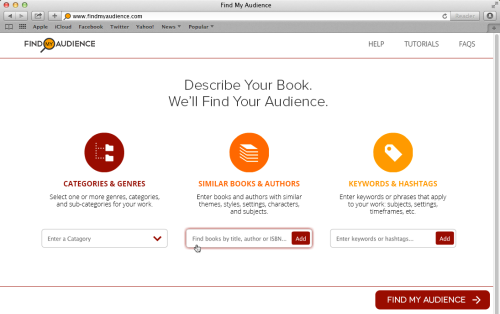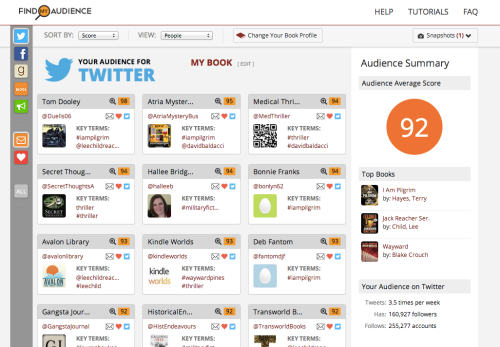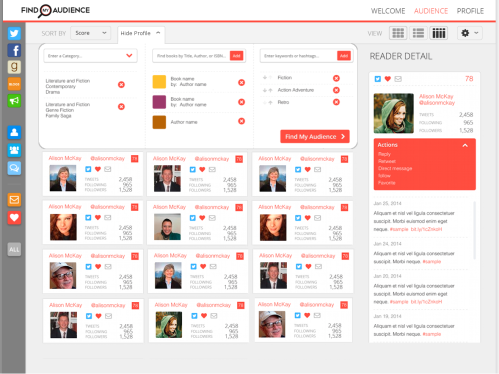Illustrations for Crew: American Spring
- Jess
- Virgil
- Manny and Tico
- Caine
- Cho Hee and Dae Ho
- Sal
- Williard LeFaye
- Teddy Carter
- Crew Members
Illustrations courtesy of Find My Audience’s Thomas Mims. To see more of Thomas’s work, visit http://www.hawkandmoon.com/.
To read Mark Schroeder’s work-in-progress, Crew: American Spring, visit WattPad at http://www.wattpad.com/75486413-crew-american-spring-the-deuce?utm_source=web&utm_medium=email&utm_content=share_info&ref_id=1103950.
And feel free to send us your own illustrations. We would love to see them!
Filed under Crew: Amercian Spring
Why Similarities Are Important In Book Marketing
We’re new to the publishing industry and so we have been, for the last year or more, eagerly devouring articles from industry notables in an attempt to “school” ourselves in the language and practice of publishing. We have, in particular, learned quite a bit from Peter McCarthy and Mike Shatzkin, founders of Logical Marketing. Their posts have not only enlightened us but have reassured us that we are heading down the right road in the development of our Audience Management Platform for Writers.
A recent presentation by McCarthy entitled The Big Ideas in Big (or Small) Marketing Data reinforced for us the critical role that “similarities” play in book marketing. The sweet spot, as McCarthy notes, is to use similarities to find the audience that is “unaware [of my book] and just might [buy)” it. These adjacent or “look-alike” audiences are comprised of people who are similar to our own followers or to a specific profile. They share the same demographic characteristics, use the same hashtags, etc. They may, in fact, like the same books.
We have trod down the same path as McCarthy in searching for those look-alike audiences – though we may use different terms and perhaps have received different inspiration for doing so. We are inspired by the philosopher Wittgenstein’s meditations on how “language” means (through “family resemblances”) and also from the linguist de Saussure, who posited that language was comprised of similarities and differences between words or signs.
This is not a leap, of course, for most writers – or readers. Amazon, Netflix and other companies have fashioned their recommendation engines so that we are constantly reading or viewing or listening to “similar” things (fortunately we can be a fan of many genres!). And many social media users are experts at finding similar hashtags through the use of www.hashtagify.me and other tools.
So we have been, instinctively, using similarities (or analogies) all along in our search for an audience (and for meaning in general). And this makes sense – as Douglas Hofstadter writes in Surfaces and Essences, “analogy is the fuel and fire of thinking.” It also drives what we are doing at Find My Audience. We are trying to automate that process, however. Take, for example, the screen presented below.
This is our Profile Screen. Here we ask writers to tell us what genre(s) their book fits into, similar books, and keywords or phrases that might describe their book. Later on, the writer will be able to provide a fuller profile, but for now, these inputs are sufficient. We use those inputs to search the social web not only for matches but for similarities to the inputs the writer entered. Below is a sample screen return from our search of Twitter.
Note that our application returns users who have been “ranked” as being potentially predisposed based on the language they are using. We then enable you to communicate directly with that user. By narrowing down the audience, we save the writer time and we provide a direct-to-consumer marketing vehicle.
There are a lot of neat feat features in our Audience Management Application and in the weeks to come we will start to share them with you. In the meantime, should you want to be on our beta list of users, send us an e-mail at mark@findmyaudience.com.
Reading and Memory
 A recent piece by Alison Flood in The Guardian brought up the issue of whether comprehension is lower when reading on a Kindle e-reader. Flood cites the work of researcher Anne Mangen of Stavanger University in Norway, who recently tested 50 people on their comprehension (plot, setting, etc.) of an Elizabeth George short story. Half of those tested read the story on a Kindle and half read it on paper.
A recent piece by Alison Flood in The Guardian brought up the issue of whether comprehension is lower when reading on a Kindle e-reader. Flood cites the work of researcher Anne Mangen of Stavanger University in Norway, who recently tested 50 people on their comprehension (plot, setting, etc.) of an Elizabeth George short story. Half of those tested read the story on a Kindle and half read it on paper.
Lo and behold, those who read the piece on a Kindle came up short when they were examined on the particulars of George’s story. Does this surprise anyone? I don’t think so.
Truth be told, our memories have, through the centuries, become increasingly downsized and outsourced. It’s true that back in the age of Homer (memory’s halcyon days), traveling bards memorized long epical poems in their entirety – and some mnemonic contortionists could recite epics like the Iliad backwards.
But even those bards used various “distributed memory sourcing” techniques. In particular they (and their followers in the centuries to come) deployed the mnemonic strategy of loci et imagines. This is a technique where one placed what one wanted to memorize in a familiar place or attached it to a familiar object. That world is far removed from our own, and indeed it must have been a magical place, one that abounded in memories – but it does underline the fact that humans have historically created or found storage devices, both for mental and physical objects.
Scholars have posited that this kind of memory, which characterizes oral cultures, was pre-analytical, pre-logical, that it was external in nature. But that changed when books started to be produced and knowledge dramatically increased; memory migrated from the world to the page. The new “print” paradigm demanded that we only know how books were categorized; of course it helped if we knew what book specific information could be found in – but it wasn’t necessary. Freed from the taxing demands of personal memorization, our minds were able to, as Walter Ong, Robert Logan, and others have argued, to become more logical, more analytical – in short, the rise of books also witnessed the rise of the rational mind.
 Goya, The Sleep of Reason Produces Monsters
Goya, The Sleep of Reason Produces Monsters
Of course this is all dialectical in the sense that one paradigm – oral, print, digital – doesn’t replace an earlier one but rather subsumes it in itself and resolves the tensions and weaknesses of the previous paradigm. Having a good memory is still important – indeed, just a generation ago reciting long poems by memory was still a staple of high-school English. And recently I heard Peter O’Toole in a Fresh Air interview reciting Shakespeare’s sonnets by memory. A magnificent performance!
So, back to the Kindle and the digital age. I wonder if the Kindle doesn’t suffer from the same cognitive ailments that plague computers: namely, automation complacency and automation bias. The former refers to those moments when a computer lulls us into believing that it has everything “handled” (including memory). The latter refers to the tendency to place too much faith in believing what the computer says or does is accurate. In an article in The Atlantic entitled “All Can Be Lost: The Risk Of Putting Our Knowledge In The Hands Of Machines” Nicholas Carr chillingly points out what can happen when we let the computer do too much for us – quite simply, we forget how to do things. And when it comes to navigation (airlines, trains, ships, cars, etc.) or the operation of large equipment that can have tragic consequences.
But what does this mean for reading – specifically for reading on devices such as the Kindle or the iPad? Do readers subconsciously change their reading habits when reading on a device? Do they not concern themselves with the details per se (since the device supposedly is) but rather with a holistic or even lateral view? Could reading on a device such as the Kindle increase empathy for characters, for the human condition? Could reading on the Kindle be, in fact, a radical act, one that challenges the “dominant” mode of thinking and remembering? Certainly changes are afoot – and in the same manner that the environment worked on and reshaped our genetic map through time, our increasing reliance on devices (and not just the Kindle and iPad but all of the devices that make up the Internet of Things) may well do the same thing to our cognitive capacities.
Of course some people will be upset. Paradigm change always has its naysayers. Think of how many people were burned at the stake or in a barrel by the Church for having a copy of the Bible (or even quoting from it). Learning and thinking for oneself have always threatened those in power – but, as Nietzsche reminded us, now more than ever it’s time to live dangerously!
Filed under EBook Marketing Innovations, FindMyAudience
Photo Of The Day
Filed under The Writer's Dashboard
Writers, Here’s What’s Coming!
It’s hard to believe, but the team at Find My Audience is only three to four weeks away from completing the Alpha stage of our Audience Management Platform for writers.
Okay, what is an Audience Management Platform? Quite simply, it is a software platform that will enable writers to search the social web for potential readers – in just seconds – and then communicate with those readers in a more sophisticated fashion than is currently available. Really.
Our software was borne out of our own frustration at trying to market our writing on the social web. We discovered that the noise-to-signal ratio was daunting — we never knew whether our tweets and posts were getting read by the right people. We figured there had to be a better way.
And there is.
Logical Marketing (founded by publishing industry veterans Peter McCarthy and Mike Shatzkin), for example, offers a wonderful service to help writers get discovered on the web. Their “foundational” approach focuses on the upfront metatagging and SEO so that an author’s work can be “discovered” by someone searching for a particular type of title. This is an enormously valuable service.
Our approach, while complementary, is different: an analogy for our software would be the Bloomberg Terminal, a computer system that enables financiers to monitor and analyze real-time market data. Our Audience Management platform is constantly searching the web for people who may be interested in your title. It is a direct-to-consumer strategy. It works while you sleep.
Now of course we are only arriving at Alpha – which means we are still at the crawling phase. There will be bugs. The algorithm will need improvement. The user interface will need adjusting. But the early results are promising. If you would like to get a sneak preview of what we are doing, we would be happy to do a virtual demo for you. Give us a shout!
Expression and Intention
Years ago I read Jacques Barzun’s Simple and Direct: A Rhetoric for Writers. Barzun was one of those elegant and lofty minds of a certain generation; think Lionel Trilling, Edmund Wilson, Mary McCarthy, the Chicago School, and maybe a little later, M.H. Abrams, Northrup Frye. You know the type: fluent in a handful of languages, many of them no longer spoken (at least by the “man on the street”); played the piano beautifully; did a stint at Oxbridge; maybe served in WW II at Bletchley Park; took a post at one of the Ivies after the war. Always dressed professionally, maybe smoked a pipe, thought that teaching and mentoring the next generation was critically important (yes, it was a long time ago!).
Thus Barzun, who died two years ago at the age of 104 and who taught at Columbia University for over 50 years. A recent discussion by the Find My Audience team about the relationship between tweets and hashtags reminded me of one of Barzun’s memorable sentences, to wit:
The mind tends to run along the groove of one’s intention and overlook the actual expression.
Barzun’s sentence reminds us of the need to always have an editor at our side, but it also has application, if of a tenuous nature, to social discourse – and in particular to the relationship between what one says, for example, in a tweet and what one intends to say (or the audience the tweet is intended for), which is often signified by the use of a hashtag.
Now of course the hashtag has multiple purposes: it inserts one into an ongoing conversation; it serves as a bit of intentional signposting for one’s tweet (“my tweet is relevant to people speaking about X”); it can even signal the start of a new conversation.
But what is actually said in a Tweet and the hashtag used in a tweet are not the same thing. The hashtag indicates, I believe, a higher-order, even meta-intention; indeed, the expression may not have anything to do, at least on the surface, with the hashtag used.
For example, take the following tweet:
Just had a great meal at The Kitchen in #Boulder. #organics #kimkardashian
The Kitchen is a well-known “farm-to-table” restaurant in Boulder, so #Boulder and #organics make sense as hashtags, but how did #kimkardashian get in there? Did I see her while eating? Do I want her to see my tweet so she will eat at The Kitchen? Am I using that hashtag to amplify my reach? It’s hard to know.
This is one of the issues we are wrangling with at Find My Audience. Do we pay more attention to the actual expression, to the hashtag(s) used, or both? What is the most important element to focus on as we try to “find your audience.” We are experimenting with different approaches. In the next few weeks we will unveil what we have discovered. Drop me an email at mark@findmyaudience.com if you would like a sneak preview.
Amazon, Hachette and Commodification
A recent editorial by Joe Nocera in the New York Times got me looking at this conflict in a new light. Nocera, a business writer with keen insight and an alert conscience, boils the conflict down in this way:
No matter what you think of Amazon’s tactics, they surely don’t violate any laws. It is acting the way hardheaded companies usually act — inflicting some pain on the party in a dispute to move it toward resolution. On some level, the book industry has never fit comfortably in the contours of big business. But over the years, as one house after another was bought by conglomerates, as they merged with each other, as they tried to increase profits with the kind of regularity that pleases Wall Street, they began the process of commoditizing books. Jeff Bezos? He’s only taking that process to its logical extreme.
With all due respect to Joe Nocera, I have to ask: really? Books are inevitably headed down the path of widgetification, in which the only thing that matters is maximizing profit margins and moving units? And there is nothing to be done about it? What a dispiriting reality, if that is true.
But I don’t think it is.
Let’s take a quick look at commodification. When it comes to the market economics of products, commodification is at the far end of the Value-Volume spectrum.
At the Value end of the spectrum, the market price of a product depends more on the unique qualities of the product. A Stradivarius violin or an original Picasso are examples of the farthest Value-based valuation. Lower down the scale, you might find a Bentley or a Rolex, elite luxury goods whose prices are based as much on their quality as on market demand and production costs (although these factor in). With a traditionally lower supply for Value products, the price skews to the highest price that buyers will pay for it (such as an art work sold at auction).
As we move down the spectrum toward Volume-based valuations, profit margin (factoring in costs of production, distribution, and marketing along with price) becomes all important. If you have the formula for producing a product at even a small profit, and you can scale your production efficiently, you can maximize overall profit infinitely by increasing volume. Most consumer packaged goods (CPGs) in the world (such as soap and soybeans) are securely toward the Volume side of the spectrum. These are commodities. Prices for commodities skew toward the lowest price a manufacturer or producer can bear.
In aggressively driving to minimize the costs associated with their supply chain, which Amazon is unquestionably doing, they are certainly abetting the commodification of books. I don’t think any writers believe this is a good thing, nor do I.
Hachette of course is taking the position that not only is commodification bad for writers, but that publishers are an intrinsic part of the value-creation process itself (they are not just glorified “manufacturers”); they provide curatorial, editorial and marketing services which raises the quality of goods across the board, which ultimately serves both readers and writers.
To a certain extent this is true, although I agree with Nocera that corporate aggregation in the publishing industry has generally worked against the Value proposition for writers, and more towards a corporate bottom line orientation. You may feel (as I know my colleague Mark Schroeder does) that Hachette’s recent round of layoffs, followed quickly by its corporate acquisition of Perseus Books Group, puts the lie to Hachette’s moral high ground stance.
I’ll conclude by affirming my own belief that the best way to look at this dispute is not to look at what is best for Amazon or Hachette, and how that might then effect our economy down the line, but instead to look at what is best for readers and writers, and ask how the publishing industry might be best aligned to serve society down the line.
Books have always been an elite product, and they have served society magnificently. Does driving book costs down for consumers really serve society? I would prefer the costs of books remain higher, to better serve readers and writers.
Filed under Uncategorized



























